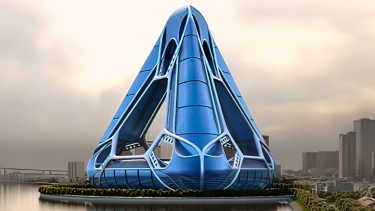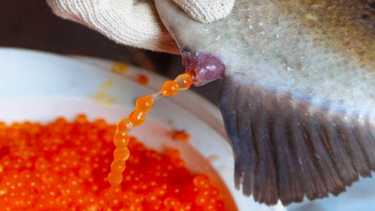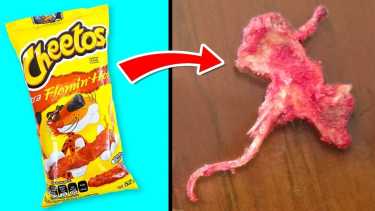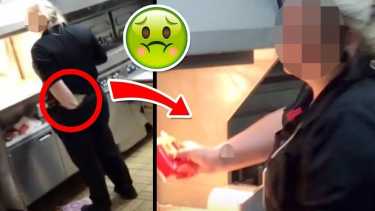Fast Food Facts You Don't Want to Know
Fast food has a series of quite disturbing secrets you probably don't want to know.
FoodQuick, easy, and affordable: these are the three pillars of fast food that keep us coming back again and again, but how much do you really know about what goes on behind closed doors? Let's explore some fast food facts you don’t want to know!
10. Subway Slip-ups
Subway markets itself as a fresher alternative to fast food, but the chain has faced its fair share of scandals over the years which might just change the way you look at a foot-long. There are plenty of choices when it comes to bread but a deep dive into its doughy contents in 2014 revealed a surprising ingredient.
The chemical azodicarbonamide was used in North American branches as a bleaching agent and dough conditioner, and although it was approved by the Food and Drug Administration for use, you should probably know that this ingredient is also used to make yoga mats and rubber shoes.

Although Subway agreed to phase out the chemical after a petition circulated online, it wasn’t long before they landed in more hot water over a controversy about sandwich wrappers.
According to research in 2017, some fast-food wrappers contained toxins like perfluorinated chemicals which have been linked to health issues like a weakened immune system and even cancer.
As small levels are technically legal, news about reformed packaging has yet to surface, so chains like Subway, Mcdonald's, Burger King, and Starbucks likely still risk widespread exposure to potentially harmful chemicals through their toxic wrappers.

9. What Came First?
How do you like your eggs in the morning? Well, in some fast-food chains, you’ll be lucky to get any egg at all. A Forbes report from 2012 analyzed the widely available listed ingredients in egg products from various franchises to expose the varying amounts of egg actually involved.
Surprisingly, McDonald’s fared pretty well with 100% egg in their breakfast McMuffin, but it was Subway’s list that was the most baffling as the egg content was manipulated by adding at least 10 other preservatives and additives.
Most troubling was the addition of glycerine which is a solvent regularly used in shaving foam and soap, as well as propylene glycol which is used in anti-freeze and deodorant sticks.
These added extras were supposedly used for ‘anti-caking’ effects and are safe to eat in small amounts, but the idea of a fragrant cosmetic-egg hybrid first thing in the morning is nonetheless unappealing.
Some of these questionable ingredients have since been removed, but Subway’s eggs are still preservative-heavy, so maybe the chain’s late entry to the fast-food breakfast market in 2010 just isn’t all it cracked up to be.
8. (DO NOT) Touchscreen
It’s not all fun and games for McDonald’s, and as the biggest fast-food distributor in the world the brand was sure to come under fire at some point.
As an industry pioneer, McDonald’s became the first fast-food chain to debut its touch-screen ordering system back in 2015, but research from November 2018 indicates that these handy systems also hide a sinister secret.
Metro UK swabbed the screens of 8 restaurants in London and Birmingham and discovered in horror that every single device contained traces of human poo. Dangerous gut and fecal coliform bacteria were found living on the machines which can cause the same kind of infections mostly picked up in hospitals.

Alarmed scientists examined the swabs and found that results from one branch even showed an almost antibiotic-resistant bacteria called staphylococcus which can cause blood poisoning and toxic shock syndrome.
Unsuspecting diners at Oxford Street and Holloway Road were also exposed to Listeria which can cause miscarriages and stillbirths in pregnant women, as well as Proteus, a bacteria carried in soil as well as animal and human feces. Next time you enter those golden arches, perhaps you should think about ordering the old-fashioned way.
7. What’s in a Shake?
Rumors about what makes McDonald’s milkshakes so thick and creamy have bordered on the ridiculous from Styrofoam fillers to being pumped full of pig fat. Fortunately, these myths aren’t true, but what if I told you the infamous line of milkshakes doesn’t contain much milk at all?

This is the reason McDonald’s is simply listing the cold drinks as ‘shakes’ on the menu in some US states due to varying regulations about dairy content. Don’t panic too much though, because the shakes are just made with reduced-fat ice cream from the soft serve machine and topped up with whipped cream, both of which do contain some dairy.
That isn’t to say animals haven’t had a strange part to play in the creation of some fast-food shakes and other desert-like drinks in the past though. For added sweetness, an age-old secret ingredient called castoreum had been used, which (believe it or not) came from the anal gland of a beaver.

This natural scent isn’t widely used in fast food anymore, but it's still widely used in the perfume industry for vanilla-scented perfumes, and is an FDA-approved method of enhancing vanilla, strawberry and raspberry flavors in commercial food under the umbrella term ‘natural flavoring’.
Although fresh secretions are expensive and too difficult to get hold of nowadays, dried castoreum sacks can be harvested from dead beavers and purchased for private use. Unfortunately, the first person to stick their nose under a beaver’s tail has been lost in time, but if a beaver-butt shake doesn’t sound like your thing, you’d be safe to stick with chocolate.
6. Creepy Crawlies
Beavers aren’t the only animals that might be involved in the preparation of your meal, and it seems like it’s the insect kind that can get away with a free share of your food. In America, the FDA regulations about the inclusion of small insects in commercial food might just shock you.
According to sanitation standards, 30 or more fly eggs and 1 or more maggots per 100 grams of tomato-based sauces used in pasta, chili or burger sauces are perfectly reasonable by law.

If you like mushrooms in your sauce, the number of unwanted guests could be doubled as 20 maggots of “any size” are permitted per 100 grams of drained or 15 grams of dried mushrooms.
Although it's highly unlikely you’d ever notice these creepy crawlers and they certainly aren’t detrimental to human health, research still shows that on average Americans likely ingest around 1-2 lbs of flies, maggots and mites in food products each year.

Everyone’s heard about artificial colourings in fast food sending kids into hyper-active overdrive but some of these colourings are more natural than you’d think. A traditional way to achieve brighter colors in products like Starbucks’ strawberry Frappuccino involved tiny cochineal beetles which are crushed up for a natural red dye.
Fortunately for vegans, Starbucks stopped using this process in 2012, and commercial chains are now required to list ‘cochineal extract’ instead of ‘natural and artificial flavouring’ on the menu.
5. Safer Salads
Some may say that going to Mcdonald's or Burger King and ordering a salad is like going to the movies and closing your eyes the whole time, and they’d be kinda right. The concept of ‘being good’ doesn’t really exist when it comes to fast food, and while picking a bowl of veggies over a cheeseburger might make you feel better it doesn’t mean it actually is.
Most fast-food salads are still packed full of saturated fats and added sodium which can be just as detrimental to your health as the naughtier option. For some perspective, a crispy Caesar salad from Mcdonald's can house a whopping 1,200 calories, which is the equivalent of two Big Macs.

If that wasn’t enough to make you think twice about keeping green, you should also know that many salad leaves like lettuce are dusted with propylene glycol, which is also used in anti-freeze and sexual lubricants.
The ingredient is considered safe by the FDA and is used to keep the greens crisper for longer, but it shows that you’re getting more than you bargained for while trying to be good.

4. Stronger Soda
Have you ever wondered why your favorite fizzy drinks taste better from fast food outlets? Some have speculated that it’s because the food is so salty that your taste buds are literally begging to be quenched, and while McDonald’s attempted to explain the mystery in 2017 by claiming the improved taste was a result of regulated chilling temperatures, there might still be something else at work.
Research suggests that fast-food soda is often pumped with higher levels of syrup in order to give it its distinctly sickly-sweet taste. High Fructose Corn Syrup has been long used as a sugar substitute in the commercial food industry, but this highly processed ingredient can have some harmful side effects.

In significant amounts, HFCS can strip away tooth enamel, stretch the stomach lining and attack your vital organs by triggering the production of fat-like cholesterol in the liver which can lead to health problems like diabetes, liver failure and heart disease.
This sugary alternative can also zap your energy as it goes straight to the bloodstream, soaking up precious phosphorous molecules from the body’s energy source as the gut attempts to absorb it. Even traces of mercury exist in each gram of the stuff, but at least we know the answer to those electrified McDonald’s Sprite memes now!
3. Mystery Meats
When it comes to finger-pointing at fast-food giants like Burger King, McDonald’s and KFC, the biggest point of contention is how much real meat goes into their products. From deep-fried rat to the infamous Mcnuggets pink-slime myth, rumors are usually debunked as quickly as they’re spread online.

This certainly isn’t to say you’re getting premium meat for such budget prices, though. In fact, each beef burger patty could contain the meat of over 100 different cows due to the process by which various cuts of meat are thrown together in a processer with a generous pump of 30% added fat before being shipped to various outlets.
In 2014, KFC and McDonald’s in China were caught up in a nasty scandal after employees at a supplier called Husi Food Co Ltd were secretly filmed changing the dates on expired meats before shipping the products off to restaurants. Thankfully, both Mcdonald's and KFC and Pizza Hut’s owner Yum! Brands cut ties with the supplier and now continue to source their produce locally.
2. Taco Trouble
Offering the overall cheapest menu of the big names in the industry, Taco Bell has also been repeatedly targeted by speculators claiming they cut corners in quality to achieve such low costs. In 2011, an Alabama law firm sued Taco Bell by suggesting that their meat was only 36% beef and 64% ‘tasteless fibres’.

The secret substance had been packaged as the mysterious product ‘Taco Meat Filling’. Images also surfaced online of the supposed mystery meat filling which had been freeze-packed to resemble a gingerbread house-like substance.
In the end, the lawsuit was suddenly dropped costing the chain a whopping $3-4 million in advertising to repair its reputation, which was only damaged again in 2013 when they were caught up in the horse-meat scandal.
Nowadays, Taco Bell proudly claims an 88% beef content on their website, but that remaining 12% still leaves a lot to be desired, and it is said to be a cocktail of additives like cellulose, potassium chloride, trehalose sugar and caramel coloring.
1. Fecal Fizz
As if McDonald’s contaminated touch-screen system wasn’t disturbing enough, it turns out you could be slurping down poo particles in your soda at pretty much any fast-food restaurant.

This stomach-churning discovery was made in 2017 when BBC One’s Watchdog tested 10 samples from McDonald’s, Burger King and KFC restaurants and discovered ice contaminated with traces of fecal coliform in most locations.
Although regulations state acceptable levels should be 0, four samples from Burger King and five from KFC were described as having ‘significant’ levels, which could pose a serious threat to diners.
Another study by microbiologists at Hollins University discovered that 48% of all soda fountains tested contained these harmful bacteria while 11% even housed dangerous strains of E-Coli.
The widespread contamination is likely down to a lack of strict ice-production standards paired with poor staff hygiene and a failure to carry out routine cleaning on ice machines. Tests on high-street coffee shops like Costa, Starbucks and Caffe Nero also produced similar results, with most samples containing potentially disease-carrying pathogens.
While small amounts of coliform in most drinking water are safe in certain percentages and the fast-food giants promised to literally clean their act up, you might still want to hold the ice while refilling your drink.
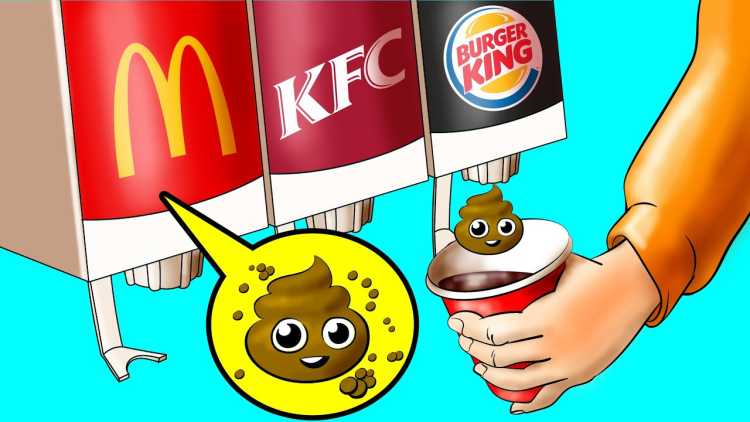
It’s important to remember that fast-food restaurants need your business to survive, so they never intend to harm you, but these secret fast food facts from the elusive industry are certainly unsettling. Thanks for reading.













![Embarrassingly Dumb Ways People Died - Darwin Awards Winners [Part 14]](http://images.ctfassets.net/l031eph9pzsg/686De1sLP59fCNWLkbDwm5/4031ad820164610867ececf9513ce5ce/embarrassingly-dumb-ways-people-died---darwin-awards-winners-_part-14_.jpg?w=750&h=422&fl=progressive&q=50&fm=jpg)


